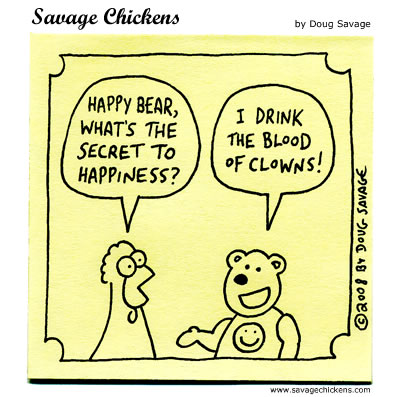"The good life, as I conceive it, is a happy life. I do not mean that if you are good you will be happy - I mean that if you are happy you will be good."
Bertrand Russell
Bertrand Russell
These kinds of quotations are always fun to examine because they are simple in content yet open the door to a myriad of questions.
Take for instance the word - good. How does Russell define good according to his naturalist worldview? Do his atoms banging against other atoms in a certain way seem "good" to him? And how does he know that these atoms banging together produce a "good thing"? Is it possible that these colliding atoms are not producing "good"? Is goodness a feeling, an idea, a law, and does it have purpose? Can my feelings of goodness change over time? Are the old feelings or definitions not good any more?
What about happiness? If I am only made up of atomic goo, how do atoms make themselves happy? Is happiness defined by my atoms spinning and interacting in a smooth manner? Is happiness connected to control? If I eat two cookies, I am happy. If I eat forty cookies, I am no longer happy. He puts happiness before goodness - as the precursor. What if the two conflict? Which comes first? When is my happiness no longer good? What if happiness results in someone else's unhappiness? Isn't it possible that one man's happiness could be another man's pain? Is it no longer happiness? How do spinning atoms define happiness? Or for that matter produce goodness? Since in his worldview he cannot define what good is nor can he account for atomic happiness, what is he really saying here?
Russell desperately wants to be happy and good. He knows that these ideas exist. He feels them, and they are real to him. But he cannot nor does he want to go too far beyond the nice pillowy comfort of an esoteric platitude to express his deep longing to be happy. He leads the pack of naturalists who deny the existance of God but cannot account for their own reasoning. They won't acknowledge their frustration with their inability to articulate why they want to be happy and good. They hate the thought of a creator who defines goodness but then borrow from that Creator to explain things like happiness and goodness. When called on the carpet concerning their inconsistent worldview, they retreat to complaining about the Christians and the God that does no good - a goodness they themselves cannot account for themselves.
Christianity is the only consistent worldview. We are the only worldview that can account for the source, existence, and meaning of goodness and happiness. We can choose to not live consistent with the Christian worldview, but that says nothing of the consistency within the worldview itself. We know we are being inconsistent. They can't see their inconsistency in their lives to their own worldview nor can they see that their worldview is itself unable to account for things like how we know, what is good, and what is reality.

















No comments:
Post a Comment